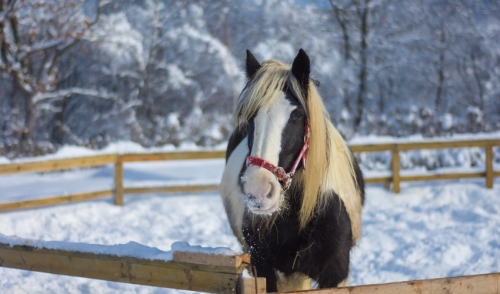
Preparing Your Horse For Winter
Everyone that has a horse, who also lives in cold winter temperatures, has a guest house where their horse can sit next to a warm fire, read books and smoke out of the finest hand-crafted pipe.
Or not…
Much of the time, horses are stuck in extremely cold temperatures with very little to protect them from the harsh weather conditions. If you don’t have a heated house for you’re your horse to stay, here are some tips on winterizing your horse:
Give me shelter
The best option for your horse is to be housed in a barn where they are surrounded on all sides by some form of protection. This is obviously the best because it keeps them, as well as their food, relatively warm and dry. If you have a pasture-bound horse, the absolute minimum should be a three-sided run-in shed facing away from the wind. Another highly recommended item is providing a waterproof blanket. If a blanket is wet and laying on your horse, he may as well not have a blanket at all. With that being the case, be sure to check that the blanket is effective in keeping the horse warm.
Exercise
Getting your horse exercise during the winter is important despite the fact that it is cold out. It’s recommended that you take him out a few times each week for light half-hour sessions. It is important that they are light because you don’t want to make your horse sweat. If they sweat they could develop a chill which is definitely not a good thing.
Hoof Care
Ever get really annoyed when snow from outside gets stuck in your shoes and you track it inside your house? Now think about the shape of your horse’s hooves and how easily snow can get caught in them. This can make walking very uncomfortable and whenever snow gets caught, be sure to get it out before it becomes a nuisance.
Food and Water
With all of the moist conditions, it is important to make sure that the hay you are giving your horse is free of mold and is stored in a dry spot where your horse can access it easily. Another important thing is making sure that your horse’s water doesn’t freeze. Despite what most people think, eating snow will not provide the same amount of hydration that drinking water does.
